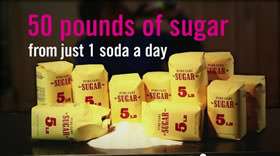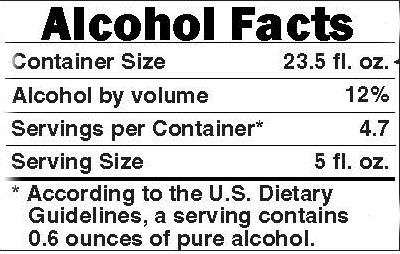Most Americans Say the Government Should Let People Drink What They Want

New York Mayor Michael Bloomberg's big beverage ban, which takes effect on March 12, imposes a 16-ounce limit on servings of sugar-sweetened drinks sold by bars, restaurants, food carts, and snack stands.
This week Bloomberg urged the New York legislature to make food service businesses throughout the state comply with his pint-size prescription. But the latest Reason-Rupe Public Opinion Survey suggests the busybody billionaire may have trouble selling this policy outside of New York City. Only one in four respondents thought "the sale of drinks larger than 16 ounces" should be prohibited, while 71 percent said it should be allowed. Similarly, 28 percent thought Bloomberg's policy is "an effective way to fight obesity," while 68 percent said it is not. Democrats were considerably more likely than Republicans to favor a 16-ounce limit (33 percent vs. 20 percent), and there was a similar gap between self-identified conservatives and progressives. Looking at age trends, support for the drink diktat was highest among respondents 65 or older, 35 percent of whom thought it was a good idea, and lowest among 45-to-54-year-olds, only 16 percent of whom wanted to tell people how much soda they may order.

There was more overall support for banning caffeinated energy drinks, an idea embraced by 34 percent of respondents and rejected by 59 percent. One reason an outright ban on energy drinks fared better than a limit on soda servings may be that most of the respondents (61 percent) were under the mistaken impression that energy drinks contain more caffeine per ounce than coffee. Another 25 percent thought the two kinds of beverages have about the same caffeine content, which is also wrong. Only 3 percent correctly said that energy drinks have less caffeine per ounce than coffee. Yellow journalists like New York Times reporter Barry Meier probably can take considerable credit for the public's confusion on this point, although the fact that energy drinks are newer and less familiar than coffee no doubt plays a role as well. (It also helps explain why reporters like Meier view energy drinks with such alarm, even though they pose a demonstrably smaller risk of caffeine overdose than coffee does.) Not surprisingly, support for banning energy drinks, which are especially popular among teenagers and young adults, rises with age. Support was lowest among respondents 34 and younger and highest among respondents 65 and older (23 percent vs. 48 percent).

Four Loko no longer counts as an energy drink, since its manufacturer, Phusion Projects, agreed to decaffeinate the fruity malt beverage in 2010 under pressure from the Food and Drug Administration. But it still contains about the same amount of alcohol per ounce as wine, which worries the Federal Trade Commission. This month the FTC announced that it had forced Phusion Projects to put a new "Alcohol Facts" label on Four Loko warning that each 23.5-ounce can contains what the government considers to be 4.7 servings of alcohol. While 14 percent of the Reason-Rupe respondents thought this information would encourage people to drink less, 17 percent said it would encourage people to drink more, and 63 percent said it would have no impact on consumption. I am proud to say that skepticism was strongest among 45-to-54-year-olds, 69 percent of whom saw the requirement as ineffective. That is also the age group that was most skeptical of Bloombergian beverage regulations, with 83 percent opposing the policy and 81 percent deeming it ineffective. Middle-aged respondents were not quite as libertarian on the subject of energy drinks, however: About two-fifths of them supported a ban.
Editor's Note: As of February 29, 2024, commenting privileges on reason.com posts are limited to Reason Plus subscribers. Past commenters are grandfathered in for a temporary period. Subscribe here to preserve your ability to comment. Your Reason Plus subscription also gives you an ad-free version of reason.com, along with full access to the digital edition and archives of Reason magazine. We request that comments be civil and on-topic. We do not moderate or assume any responsibility for comments, which are owned by the readers who post them. Comments do not represent the views of reason.com or Reason Foundation. We reserve the right to delete any comment and ban commenters for any reason at any time. Comments may only be edited within 5 minutes of posting. Report abuses.
Please to post comments


The New York legislature, fresh off of effectively banning legal gun ownership, isn't about to tackle something as important to individual liberty like Mr. Pibb.
Frigging busybodies - don't buy the big drinks if you don't want to.
But why screw the poor and/or frugal? Many is the time I've ordered
one big drink and split it among three or four of us, rather than buy each of the kids their own (higher priced) cup of sugared and flavored water.
DANGEROUS LOOPHOLE!!!1!!!
Maybe the beverage industry should unionize? It might make the progtard Bloomberg rethink this whole ban.
I am not a violent man, but if they come for my large bottle of Mountain Dew Throwback, I am going to have to get a gun.
This is how Democrats and progressives affirm your right to make choices over your own body.
We just need to convince progs that drinking soda is a slow-motion, retroactive abortion -- our bodies; our choice.
I've never seen an alcohol facts label on a beverage before. If I was Phusion, I'd lawyer up hard based on the fact nobody else has to put one on their product.
Bloomberg and Cuomo... Just trying to make NY and NYC the safest and dumbest places in the country.
Thank you both SO much!